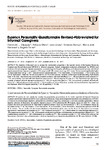Eysenck Personality Questionnaire Revised-Abbreviated for Informal Caregivers

Use this link to cite
http://hdl.handle.net/2183/38733
Except where otherwise noted, this item's license is described as Atribución-NoComercial-SinDerivadas 3.0 España
Collections
- Investigación (FEDU) [938]
Metadata
Show full item recordTitle
Eysenck Personality Questionnaire Revised-Abbreviated for Informal CaregiversAlternative Title(s)
Cuestionario de Personalidad de Eysenck Revisado-Abreviado para cuidadores informalesAuthor(s)
Date
2019-05-03Citation
Vázquez, F. L., Otero, P., López, L., Blanco, V., Ferraces, M. J. y Torres, A. (2019). Eysenck Personality Questionnaire Revised-Abbreviated for Informal Caregivers. Revista Iberoamericana de Psicología y Salud, 10 (2), 90-106. https://doi.org/10.23923/j.rips.2019.02.028
Abstract
[Abstract] The objective of this study was to analyze the psychometric properties of the Spanish version of the Eysenck Personality Questionnaire Revised-Abbreviated (EPQR-A) in informal caregivers. Trained, independent evaluators administered the EPQR-A and evaluated informal caregivers’ depressive symptoms, automatic negative thoughts, self-efficacy, and pleasant social contacts, and clinical experts assessed major depressive episode in 592 caregivers (87.2% women, mean age 55.4 years). Women scored significantly higher on Neuroticism than men (p < .001). Subscale internal consistencies were .77 for Neuroticism, .75 for Extraversion, .47 for Sincerity; and .24 for Psychoticism. These four factors accounted for 38.1% of total variance. However, a three-factor model (excluding Psychoticism) better fit the data. Neuroticism was significantly, inversely correlated with both self-efficacy (r = -.35) and pleasant social contacts (r = -.22), and positively correlated with both depressive symptoms (r = .59) and negative thoughts (r = .53). Extraversion was significantly, inversely correlated with both depressive symptoms (r = -.22) and negative thoughts (r = -.22), and positively correlated with both selfefficacy (r = .36) and pleasant social contacts (r = .16). A cutoff score of 4 on Neuroticism suitably discriminated between depressed and non-depressed informal caregivers (sensitivity = 68.1%, specificity = 79.9%). [Resumen] El objetivo de este estudio fue analizar las propiedades psicométricas de la versión española del Eysenck Personality Questionnaire Revised-Abbreviated (EPQR-A) en cuidadores informales. Evaluadores independientes entrenados administraron el EPQR-A
y evaluaron la sintomatología depresiva, pensamientos automáticos negativos, autoeficacia y contactos sociales agradables y clínicos expertos valoraron el diagnóstico de episodio depresivo mayor a 592 cuidadores (87.2% mujeres, media de edad 55.4 años). Las mujeres obtuvieron una puntuación en Neuroticismo significativamente mayor que los hombres (p < .001). La consistencia interna de las subescalas fue .77 en Neuroticismo, .75 en Extraversión, .47 en Sinceridad y .24 en Psicoticismo. Estos factores explicaron el 38.1% de la varianza. Pero un modelo de tres factores (excluyendo Psicoticismo) ajustó mejor con los datos. El Neuroticismo correlacionó significativa e inversamente con autoeficacia (r = -.35) y contactos sociales (r = -.22), y directamente con sintomatología depresiva (r = .59) y pensamientos negativos (r = .53). La Extraversión correlacionó significativa e inversamente con sintomatología depresiva (r = -.22) y pensamientos negativos (r = -.22), y directamente con autoeficacia (r = .36) y contactos sociales (r = .16). Un punto de corte de 4 en Neuroticismo discriminó adecuadamente entre cuidadores deprimidos y no deprimidos (sensibilidad= 68.1%; especificidad= 79.9%).
Keywords
EPQR-A
Personality
Caregiver
Psychometric properties
Personalidad
Cuidador
Propiedades psicométricas
Personality
Caregiver
Psychometric properties
Personalidad
Cuidador
Propiedades psicométricas
Editor version
Rights
Atribución-NoComercial-SinDerivadas 3.0 España
ISSN
1989-9246






